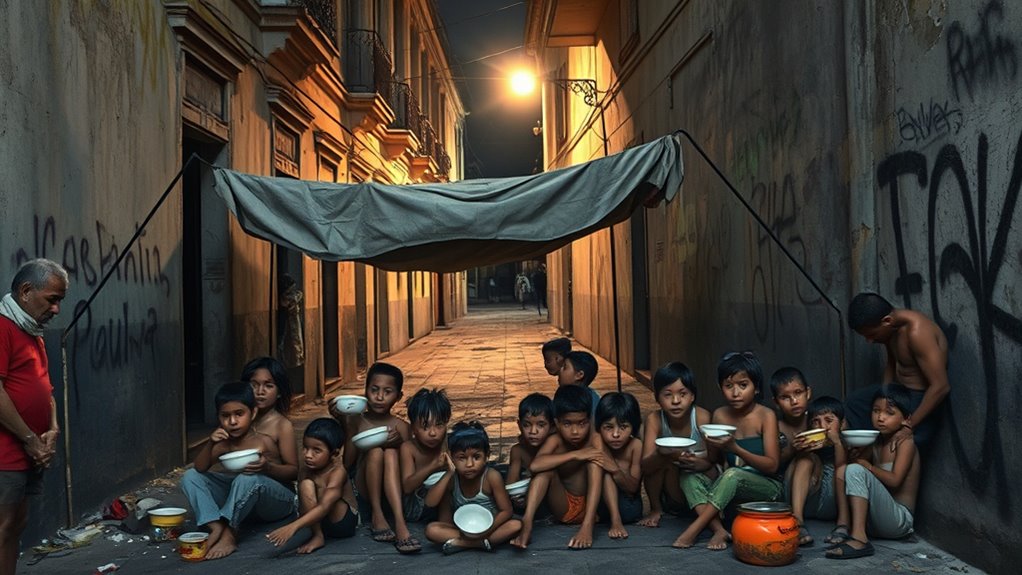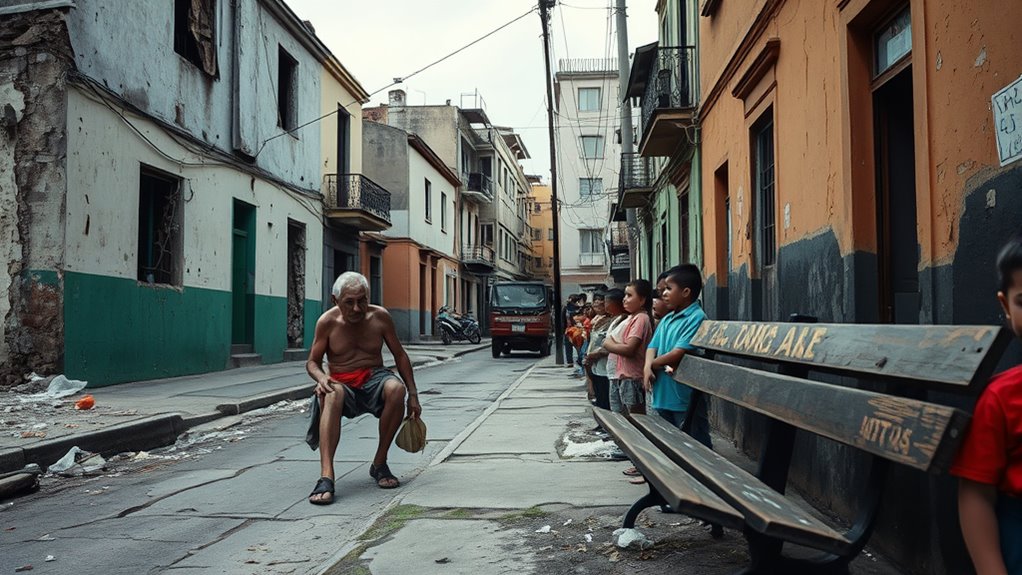You’re witnessing Venezuela’s economic collapse, where plummeting oil revenues lead to hyperinflation, currency devaluations, and shortages of food, medicine, and basic supplies. This creates widespread hardship, with many families struggling to access essentials or healthcare while surging crime and social unrest grow. Millions have fled, leaving behind homes and jobs, as sanctions and economic decline worsen conditions. To understand how this crisis continues to unfold and affect everyday lives, keep exploring the details.
Key Takeaways
- Venezuela’s economy has severely collapsed due to plummeting oil production and hyperinflation.
- Widespread shortages of food, medicines, and basic goods have led to increased poverty and desperation.
- Healthcare systems are overwhelmed, with shortages and reduced access to medical treatment.
- Rising crime and social unrest threaten safety and stability nationwide.
- Millions have fled the country, creating a humanitarian crisis with displaced populations and international repercussions.

The Venezuelan crisis continues to unfold, with economic turmoil and political instability worsening daily. As someone observing from afar or living through the chaos, you can’t ignore how deeply the country’s collapse affects everyday life. The once-robust oil industry, which fueled Venezuela’s economy, has all but ground to a halt. Oil production plummets, leading to shrinking revenues and fueling inflation that spirals beyond control. Currency devaluations happen almost weekly, making your money worth less and less, and leaving you struggling to buy basic necessities. Food shortages become more severe, forcing you and others to wait in long lines or scavenge for supplies, often with little success. The scarcity fuels desperation, and prices skyrocket on black markets, pushing even the essentials out of reach for many families.
You see hospitals overwhelmed, with shortages of medicines and medical supplies. Healthcare workers work tirelessly but are hampered by lack of resources, which means your access to proper treatment diminishes. As an individual, your health risks increase because of poor sanitation, malnutrition, and the spread of preventable diseases. The social fabric frays as crime rates climb, with theft and violence becoming common in neighborhoods. You may feel unsafe walking the streets or worry about your loved ones’ security. The government’s response remains ineffective or absent, deepening your sense of frustration and helplessness. Political protests continue, but crackdowns and arrests only add to the chaos, making you feel caught in a cycle with no clear way out.
Economic sanctions imposed by other nations aim to pressure the regime, but they also worsen your suffering. These measures restrict trade and block access to essential goods, further destabilizing your daily life. Many people resort to informal economies, risking arrest or exploitation just to survive. Meanwhile, millions have fled the country, seeking refuge elsewhere, leaving behind homes, jobs, and families. If you’re among the displaced, you face uncertain futures in crowded camps or foreign lands, often with limited support or legal status. The ongoing crisis also erodes hope; you might wonder if things will ever improve or if your children will know a different Venezuela. Additionally, the collapse of the oil industry plays a significant role in deepening economic hardship, as it was once the backbone of the nation’s wealth. Every day, you confront a reality shaped by economic collapse and political chaos—a reality that strips away stability and forces you to adapt to a life marked by scarcity, insecurity, and uncertainty.
Frequently Asked Questions
How Is the Venezuelan Diaspora Affected by the Crisis?
You’re likely impacted by the Venezuelan diaspora as many families are separated, and you might face emotional and financial strain. You might also experience increased cultural diversity and new opportunities in host countries, but also encounter challenges like integration and discrimination. The crisis pushes many Venezuelans to seek better futures abroad, which can create a sense of loss and resilience within your community. Your support networks and adaptation are vital in this ongoing situation.
What Role Do International Organizations Play in Relief Efforts?
International organizations play a vital role in providing relief efforts by offering humanitarian aid, medical supplies, and food assistance. They coordinate with local agencies to guarantee aid reaches those in need quickly. You can see their efforts through programs that support refugees, improve access to healthcare, and promote economic stability. Their work helps mitigate some effects of the crisis and offers hope to Venezuelans seeking safety and support.
Are There Any Signs of Economic Recovery or Stabilization?
You might think recovery is impossible, but signs of stabilization are emerging. You’ll notice small improvements in inflation rates, currency value, and food availability, signaling slow but steady progress. International aid and economic reforms are gradually restoring stability. While challenges remain, these positive signs show that with continued effort and support, Venezuela’s economy could recover better than many expect. Stay hopeful—change is happening, even if it’s just at a cautious, incremental pace.
How Has the Crisis Impacted Venezuela’s Healthcare System Long-Term?
You’ll find that Venezuela’s healthcare system has suffered long-term damage, with many hospitals lacking essential supplies and staff shortages becoming common. You might notice increased patient mortality rates and reduced access to quality care, especially in rural areas. The ongoing crisis has led to a decline in medical infrastructure, making it harder for you and others to get proper treatment. These challenges persist, severely impacting public health over time.
What Are the Prospects for Political Stability in the Near Future?
You might wonder if stability’s on the horizon, but the prospects remain uncertain. Currently, over 80% of Venezuelans report feeling insecure about the future, indicating deep-rooted political unrest. While international efforts aim to foster dialogue, persistent economic struggles and leadership disputes hinder progress. You should stay attentive to ongoing negotiations, as small diplomatic advances could eventually lead to more stability, though significant change still seems distant in the near future.
Conclusion
As you witness Venezuela’s crisis, imagine a once-vibrant garden now choked by weeds and drought. The blossoms of hope and prosperity have withered, leaving behind a barren landscape. Yet, just as a garden can be revived with care and resilience, so too can Venezuela find renewal. Your awareness and action are the waters and sunshine it needs. Together, you can help nurture the seeds of recovery and restore its future bloom.










